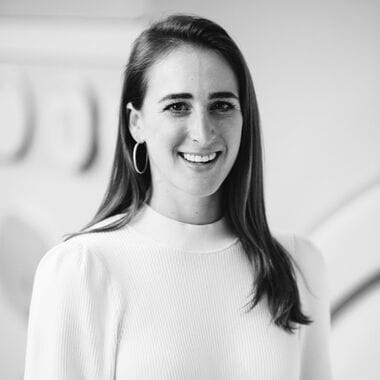Morgan Weisman
Dallas-Fort Worth '13
Morgan Weisman, a Product Marketing Manager for Google for Education, shares her work is changing the lives of educators globally.
Q&A
What inspired you to join Teach For America?
I took a legislation and lobbying class in college, where I sat in on the Tennessee House of Representatives Committee on Education once a week for an entire semester. What I saw appalled me: Decision-makers snoozing, leaving the room, and generally not respecting the student and teacher groups coming in and lobbying. I thought, “These are the people making decisions about education?” I poked my head far out of my bubble and learned about TFA, hoping to learn about education the best way I knew how: On the ground as a teacher...to then eventually go effectuate policy.
What's your favorite memory from the classroom?
During my first year of teaching, my dad came to visit my classroom. My students were all sitting on the carpet, and in my morning message, I asked them who they thought our surprise visitor was. They took one look at the white man in a suit in our classroom, and immediately screamed out, “It’s the President!” Recovering from laughing, I said, “No, it’s not the President. Who else can it be?” They screamed, “It’s Abraham Lincoln!!” Once again, I said, “It can’t possibly be him, who else is it?” and they yelled out, “It’s Barack Obama!”
I almost wish I had let it continue, but after we had a nice discussion of why it couldn’t be the President, Lincoln, or Obama, they discovered it was my dad. They couldn’t fathom that Ms. Weisman’s dad was actually in our classroom, and they got to ask him any question they wanted (What was I like when I was their age? What was my favorite book? Where did he live? Did he go to Vanderbilt too?) It was one of my most treasured moments, where my dad was able to see me as an adult, teaching and responsible for twenty-five curious, bright, incredible five-year-olds, and where I was able to share my biggest fan right back with my students.
How did your experience in the corps impact your career pathway?
My major, HOD, led me to think about the individuals, teams, and how companies are organized. During TFA, I looked at my school as a dysfunctional organization, and spent a lot of time observing different conflict and communication styles and thinking about how to improve the culture and psychological safety. I joined Google to learn from one of the best cultures out there (I highly recommend reading Work Rules!) and eventually take that back to schools and the classroom.
While teaching, I was bit by the education bug, as I like to say. My life was forever changed by my kindergartners, and my path changed from being interested in policy to closing the achievement gap. Instead of accepting a principal fellowship, I joined Google to learn how to build a transformational culture.
What skills from the classroom have you been able to translate to your current role?
I will never have a job as challenging or demanding as teaching… and everything I learned while teaching has served me well at Google. As a teacher, you operate with a sense of urgency, because your product is a child. If you don’t do the work, they don’t learn.
At Google, I operate with that sense of urgency, but I can also maintain perspective because everything I do is to support educators on the ground. As a teacher, you’re scrappy, can make something out of nothing, flexible and adaptable (because nothing goes according to plan!), and you’re able to see a much bigger picture when you learn to backwards plan.
What do you appreciate about the TFA community?
We joke that TFA hand-picked our friends, but it’s true. I met my best friends during TFA. They recruited like-minded, passionate people who also were normal humans, and we grew up together, went through very challenging times, and were each others’ support systems.
What I appreciate the most about the TFA community is how we have this incredible connection because of what we went through, no matter where in the country you served, and what your experience was. We all have educational equity ingrained in us and want to support each other and lift each other up.
One piece of advice you have for our incoming corps of teachers?
Don’t forget to take time for yourself. That can be a run at the end of a long day, calling a family member who lives far away, and cooking dinner for your friends. Figure out what your coping mechanisms are and what helps pull you out of a slump, because there will be slumps. And during the school day, take time for yourself too.
When I was having a bad day, I used to pull a student aside and have them read to me, or tell me their letters or numbers, to remind myself of the incremental progress they were making, no matter how small or large, and how I was integral (and the right person!) to help them get there. Don’t let yourself forget your “why” and figure out ways to help you remind yourself of it every single day.



